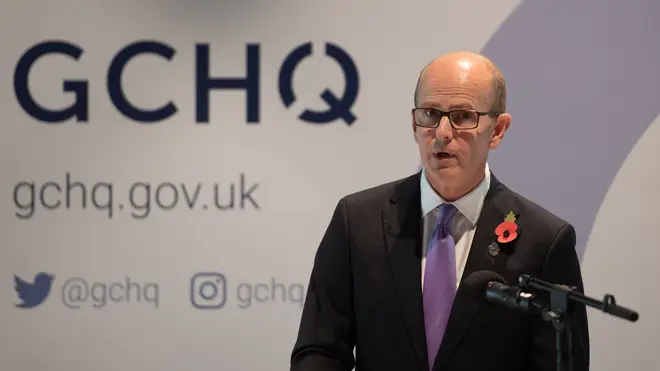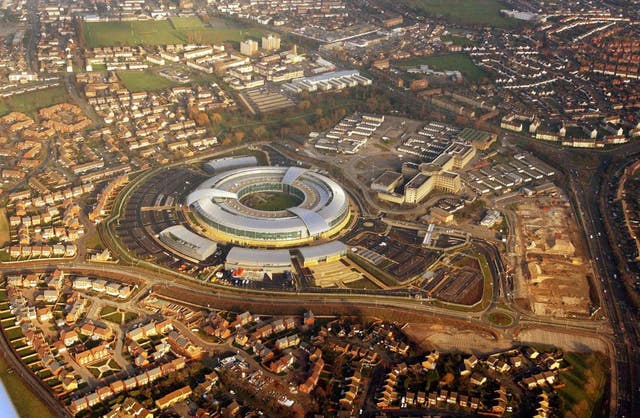
Richard Spurr 1am - 4am
23 April 2021, 14:04

Jeremy Fleming said the UK and its allies must adapt with evolving technology to stay ahead of digital threats.
Russia remains the “most acute threat to the UK’s national and collective security” as it continues to demonstrate malign behaviour around the world, the director of GCHQ has warned.
Jeremy Fleming said significant technology leadership is moving to countries like Russia and China, causing a conflict of interests and values for the west.
The director called out adversaries for misusing tools meant to bring society together to instead “fuel division, exploit vulnerable people and peddle extreme views”.
The #TuringChallenge is still here for you to solve 🧩
Can you hunt down the answers to 12 puzzles hidden on the new note this weekend? 🕵️♀️
Get to work ⬇️ https://t.co/m191L9nAgc pic.twitter.com/MulDNKOoaa
— GCHQ (@GCHQ) April 23, 2021
“As an intelligence chief, I am bound to say that Russia and China remain of concern,” he said as he gave the annual Imperial College Vincent Briscoe Annual Security Lecture.
“Russia’s pattern of malign behaviour around the world – whether in cyberspace, in election interference or in the aggressive operations of their intelligence services – demonstrates that it remains the most acute threat to the UK’s national and collective security.
“Previously, I and others have pointed out that in terms of our national security, Russia is affecting the weather, whilst China is shaping the climate.
“That remains the case. But when it comes to technology, I’ll use another analogy. The threat posed by Russia’s activity is like finding a vulnerability on a specific app on your phone – it’s potentially serious, but you can probably use an alternative.
“However, the concern is that China’s size and technological weight means that it has the potential to control the global operating system.”
A few tips to help you enjoy a secure shopping experience online https://t.co/AVCzw3TH1s pic.twitter.com/RQSM66Eu6T
— NCSC UK (@NCSC) April 23, 2021
Mr Fleming said the coronavirus pandemic and the increased reliance society had placed on technology had not only benefited the UK and its allies, but also “our foes”, who have exploited “accelerations in connectivity and poor cyber security”.
In response to this threat, Mr Fleming said it was now vital that the UK adapt in order to keep up with the evolving threats, calling it a “moment of reckoning”.
He said the UK must lead conversations with its allies about global cyber defence, safeguarding democracy and how to collaborate in protecting scientific research and supply chains.
“As a responsible cyber power, the UK has a key role in shaping international standards and laws,” he said.
“According to the most recent report from the UN special rapporteur on the right to privacy, the legislation which governs my agency’s actions is world-leading. But it must continue to evolve so we retain our licence to operate with a myriad of new technologies coming into play.”
The warning comes amid wider political tensions between powers in the West and East.
Most recently, Beijing’s national security law imposed on Hong Kong has been a major source of contention, while concerns have been raised about Ukraine’s border due to the recent Russian military build-up of forces there.

“In the real world, scientific consensus agrees we face a climate emergency,” he said.
“In the digital environment, we face another existential threat to our way of life as the old order is replaced by players who don’t share our values or follow the rules.
“To stay relevant, the UK and like-minded allies are recognising that the landscape is shifting and that there is a pressing need to act.”
He added that the UK’s influence and advantage “needs to be constantly reinvented”, adding: “The UK has always enjoyed a strong track record in technology innovation.
“Today, we can be proud of innovations in everything from AI to biosciences and beyond.
“As a country, we need to be using all the levers and tools at our disposal to shape and grow key technologies and markets.
“We must do that in a way that helps protect the nation and open society.
“And that means becoming better at using the power of the state to both foster and protect brilliant developments in technology.”
The GCHQ director spoke about the Government’s Integrated Review of foreign and defence policy, saying that the UK should develop sovereign technologies in key areas like quantum, work with allies to build better cyber defences, and develop the country’s cyber skills, if the UK was to keep up.